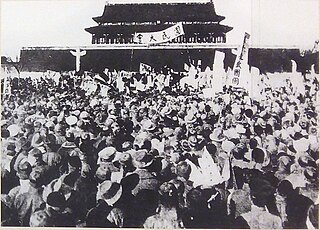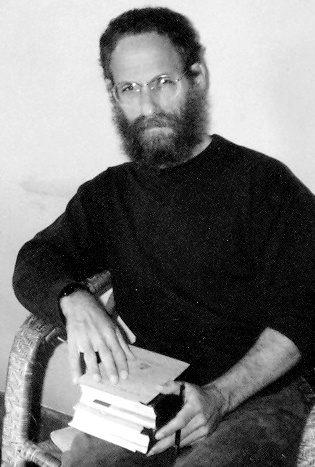Enlightenment or enlighten may refer to:
Philology is the study of language in oral and written historical sources; it is the intersection of textual criticism, literary criticism, history, and linguistics. Philology is also defined as the study of literary texts as well as oral and written records, the establishment of their authenticity and their original form, and the determination of their meaning. A person who pursues this kind of study is known as a philologist.

The trivium is the lower division of the seven liberal arts and comprises grammar, logic, and rhetoric.

Eunice Mary Kennedy Shriver was an American philanthropist and a member of the Kennedy family. She was the founder of the Special Olympics, a sports organization for persons with physical and intellectual disabilities. For her efforts on behalf of disabled people, Shriver was awarded the Presidential Medal of Freedom in 1984.

The May Fourth Movement was a Chinese anti-imperialist, cultural, and political movement which grew out of student protests in Beijing on May 4, 1919. Students gathered in front of Tiananmen to protest the Chinese government's weak response to the Treaty of Versailles decision to allow Japan to retain territories in Shandong that had been surrendered by Germany after the Siege of Tsingtao in 1914. The demonstrations sparked nation-wide protests and spurred an upsurge in Chinese nationalism, a shift towards political mobilization away from cultural activities, and a move towards a populist base, away from traditional intellectual and political elites.
The Hundred Flowers Campaign, also termed the Hundred Flowers Movement, was a period from 1956 to 1957 in the People's Republic of China during which the Communist Party of China (CPC) encouraged citizens to openly express their opinions of the Communist Party. Following the failure of the campaign, CPC Chairman Mao Zedong conducted an ideological crackdown on those who criticized the party, which continued through 1959.
Transcendentalism is a philosophical movement that developed in the late 1820s and 1830s in the New England region of the United States. A core belief is in the inherent goodness of people and nature, and while society and its institutions have corrupted the purity of the individual, people are at their best when truly "self-reliant" and independent. Transcendentalists saw divine experience inherent in the everyday, rather than believing in a distant heaven. Transcendentalists saw physical and spiritual phenomena as part of dynamic processes rather than discrete entities.
The New Culture Movement was a movement in China in the 1910s and 1920s that criticized classical Chinese ideas and promoted a new Chinese culture based upon progressive, modern ideals like elections and science. Arising out of disillusionment with traditional Chinese culture following the failure of the Republic of China to address China's problems, it featured scholars such as Chen Duxiu, Cai Yuanpei, Chen Hengzhe, Li Dazhao, Lu Xun, Zhou Zuoren, He Dong, Qian Xuantong, Liu Bannong, Bing Xin, and Hu Shih, many classically educated, who led a revolt against Confucianism. The movement was launched by the writers of New Youth magazine, where these intellectuals promoted a new society based on unconstrained individuals rather than the traditional Confucian system.
The Access to Knowledge (A2K) movement is a loose collection of civil society groups, governments, and individuals converging on the idea that access to knowledge should be linked to fundamental principles of justice, freedom, and economic development.

The free-culture movement is a social movement that promotes the freedom to distribute and modify the creative works of others in the form of free content or open content without compensation to, or the consent of, the work's original creators, by using the Internet and other forms of media.

Fu Ssu-nien, was a Chinese historian, linguist, and writer. He was one of the leaders of the May Fourth Movement in 1919. He was also one of the creators of the Academia Sinica, and was named director of the Institute of History and Philology upon its founding in 1928.

Sheldon I. Pollock is an American scholar of Sanskrit, the intellectual and literary history of India, and comparative intellectual history. He is the Arvind Raghunathan Professor of South Asian Studies at Columbia University. He was the general editor of the Clay Sanskrit Library and the founding editor of the Murty Classical Library of India.
Han learning, or the Han school of classical philology, was an intellectual movement that reached its height in the middle of the Qing dynasty (1644–1912) in China. The focus of the movement was to reject neo-Confucianism in order to return to a study of the original Confucian texts.
Movement conservatism is a term used by political analysts to describe conservatives in the United States since the mid-20th century and the New Right. According to George H. Nash (2009) the movement comprises a coalition of five distinct impulses. From the mid-1930s to the 1960s, libertarians, traditionalists, and anti-communists made up this coalition, with the goal of fighting the liberals' New Deal. In the 1970s, two more impulses were added with the addition of neoconservatives and the religious right.
In philology, a commentary is a line-by-line or even word-by-word explication usually attached to an edition of a text in the same or an accompanying volume. It may draw on methodologies of close reading and literary criticism, but its primary purpose is to elucidate the language of the text and the specific culture that produced it, both of which may be foreign to the reader. Such a commentary usually takes the form of footnotes, endnotes, or separate text cross-referenced by line, paragraph or page.

Marina Vladimirovna Orlova is a Russian host of a popular YouTube channel, HotForWords and a corresponding website. In 2012 she started an online series of videos for a personal finance website Bankrate.com where she explains the meaning of commonly used financial and economic terms.

New Text Confucianism is a school of thought in Confucianism that was based on Confucian classics recompiled in the early Han dynasty by Confucians who survived the burning of books and burying of scholars during the Qin dynasty. The survivors wrote the classics in the contemporary characters of their time, and these texts were later dubbed as "New Text". New Text school attained prominence in the Western Han dynasty and became the official interpretation for Confucianism, which was adopted as the official ideology by Emperor Wu of Han.
The Narodniks were a politically conscious movement of the Russian intelligentsia in the 1860s and 1870s, some of whom became involved in revolutionary agitation against tsarism. Their ideology, known as Narodism, Narodnism or Narodnichestvo, was a form of agrarian socialism though it is often misunderstood as populism.
The intellectual dark web (IDW) is a label which has been applied to some commentators who oppose identity politics, political correctness, and cancel culture in higher education and the news media within Western countries.
New Philology is, in Medieval Studies, an intellectual movement which seeks to move beyond the text-critical method associated with to Karl Lachmann, which sought to gather manuscripts of a given text and use them reconstruct a version of that text as close as possible to the earliest written version. In contrast, New Philology seeks to edit and study texts in the form in which they are attested. A key moment for the start of the movement was the 1989 publication of Bernard Cerquiglini's Eloge de la variante, which was critical of modernist positivist editorial practices for medieval texts. In the Anglophone world, the movement is particularly associated with a special issue of the Medieval Studies journal Speculum. A prominent step for the movement in the German-speaking world came in 1994 with the Deutsche Forschungsgemeinschaft symposium entitled "Der unfeste Text", where, for example, Joachim Bumke considered the history of transmission and textual criticism of courtly epics in the thirteenth century.







